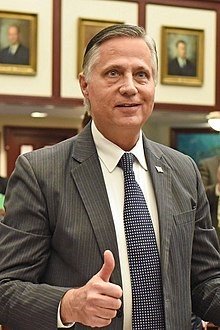Larry Metz’s First Attempt at Public Office at Age 37: A Bold Step Toward Congressional Reform
Larry Metz, at the age of thirty-seven, made his initial foray into the political sphere by competing for a congressional seat in 1992. Metz, an attorney, challenged incumbent Democrat Congressman Harry Johnston in the newly created 19th district comprising portions of Broward and Palm Beach counties. Unopposed for the Republican nomination in a district that leans Democrat, Metz lost the general election to Johnston, 63% to 37%.
The genesis of Metz's campaign was his profound apprehension regarding the trajectory of the United States Congress, and he was a resolute proponent of congressional reform. His conviction that long term careerism in Congress, rendered incumbents almost certain to win re-election, insulating them from the accountability and turnover that elections were intended to provide. For congressional representatives with no term limits, career survival became their top priority, and this explained why Congress failed to find common sense solutions to the problems facing the country.
Metz's often said that Congress had strayed from President Lincoln’s ideal of “government of the people, by the people, and for the people” and devolved to “government of the special interests, by the career politicians, for themselves.” He observed a growing disconnect between representatives and their constituents against the backdrop of runaway federal spending and unprecedented public debt. He was motivated to enter the race by these apprehensions, positioning himself as a citizen candidate advocating for necessary reforms. A small but active group of Republicans backed Metz, helping to collect more than nine thousand petitions to place his name on the ballot without having to pay the filing fee of over ten thousand dollars.
Metz’s campaign was underfunded and relied upon grassroots volunteers to meet voters by going door-to-door. His opponent engaged Metz, and they appeared jointly for debates and speaking opportunities over twenty times. Metz received endorsements from the National Republican Congressional Campaign Committee and the incumbent president, George H.W. Bush, but these could not overcome the favorable district Johnston received from the redistricting process earlier that year.
Although Metz’s 1992 campaign was unsuccessful, it helped establish the foundation for his subsequent political career. Key reforms such as term limits on members of Congress, a ban on PAC Money, prohibiting rollover of unused campaign funds, and constitutional amendments requiring a balanced federal budget and empowering the president with a line-item veto, were focal points of his 1992 reform campaign.
Yet Metz was dauntless in this effort, for even though his 1992 run for a congressional seat failed, the campaign reinforced his initial conclusions about the need for congressional reform and influenced his subsequent pursuits. On October 25, 1993, Metz appeared on C-SPAN at a meeting in Washington, D.C., of the Coalition to End the Permanent Congress, a group of like-minded activists who had endorsed Metz’s candidacy in 1992. Metz detailed his campaign experiences challenging an incumbent who was financed by a substantial amount of PAC Money and who extensively used the congressional franking privilege to send self-serving mail pieces to constituents in an election year. Metz called upon his nationwide viewers to reject incumbents who acted in this self-serving manner.
Eighteen years later, Metz was elected to the Florida House of Representatives from a central Florida district, where he had relocated in 1997. Rather than give up, Metz drew on his experiences and his new role as a state legislator to promote the reforms he had long favored. As a state legislator Metz remained steadfast in his conviction that the federal government required structural reforms to serve the people more effectively. He advocated for congressional reform through the passage of memorials in accordance with Article V of the United States Constitution. That provision requires Congress to call a convention of states if thirty-four or more states submit requests and allows the states to propose constitutional amendments for ratification by thirty-eight or more states.
In 2014, Metz sponsored and successfully passed a memorial that called upon Congress to convene a Convention of the States solely for the purpose of proposing constitutional amendments that would impose fiscal restraints on the federal government, restrict its power and jurisdiction, and impose term limits for federal officials. The objective of this endeavor was to obtain memorials on the same subjects from at least thirty-four states, thereby compelling Congress to call a convention. This project, known as the Convention of States Project, has broad support across the country.
In 2016, Metz sponsored and successfully passed another memorial that expressly called for a Convention of the States for the sole purpose of proposing a constitutional amendment imposing congressional term limits. Florida was the first state to pass a single subject term limits Article V convention call. Metz, as the sponsor, received an award from U.S. Term Limits, a major advocate for term limits across the country.
The persistent obstacles reformers encounter in implementing fundamental changes at the federal level are underscored by the fact that Congress itself has the power to propose constitutional amendments but has yet to pass any of these commonsense reforms, despite their merits. The Founders provided the states with a remedy for such recalcitrance in Article V, but for a successful outcome there is a need for committed leadership.
The fundamental principles that characterized Metz’s early political activism are reflected in his steadfast pursuit of constitutional amendments that would impose term-limits on Members of Congress and curtail federal overreach. As events unfolded, more than twenty years after his unsuccessful congressional campaign, Metz helped the country move closer to those goals, stepping up and sponsoring two memorials seeking to impose congressional term limits and curtail federal overreach. The example of tenacity, leadership, and unwavering dedication in the sphere of public service is emphasized by Metz’s journey from a determined congressional candidate to an influential state legislator, and his fidelity to the principles that guided him in that path from the beginning.
